名词性从句(新)
- 格式:doc
- 大小:58.50 KB
- 文档页数:14
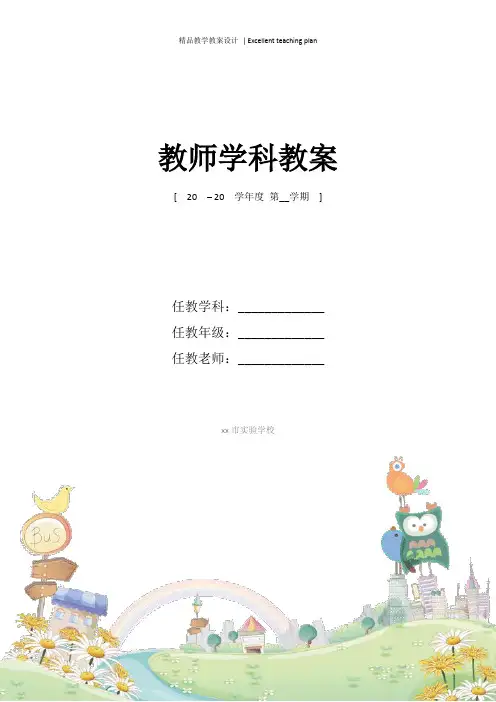
教师学科教案[ 20 – 20 学年度第__学期]任教学科:_____________任教年级:_____________任教老师:_____________xx市实验学校名词性从句讲解(复习课)一、热点考点回顾(一)名词性从句定义在句子中起名词作用的句子叫名词性从句 (Noun Clauses),名词性从句的功能相当于名词或名词词组,它在复合句中能担任主语、宾语、表语、同位语。
因此根据它在句中不同的语法功能,名词性从句又可分别称为主语从句、宾语从句、表语从句和同位语从句。
从高考的考查的实际情况来看,名词性从句考得最多的是宾语从句,其次是主语从句,再次是表语从句,而同位语从句则很少考查。
(二)名词性从句1.从句的分类形容词性从句,即定语从句状语从句从句主语从句名词性从句宾语从句表语从句同位语从句2.说明:①名词性从句的功能相当于名词,根据其在句中充当的成份,有不同的叫法。
②引导名词性从句的连接词主要有:a.从属连词that,无词义,不作句子成分;在宾语从句中可省略,但引导其他名词性从句时通常不省略。
I hope (that) you will enjoy your holiday. 希望你假期过得好。
That he likes you is very obvious. 很显然他喜欢你。
b.从属连词if,whether(是否)有词义,但不作句子成分。
引导宾语从句时,可换成互换,但引导其他名词性从句时不能换成if;He asked whether [if] I would show him the way. 他问我是否可以给他带路。
Whether it will do us harm remains to be seen. 是否对我们有害还要看一看。
(引导主语从句,不能用if 代替whether)c.从属连词as if(=as though,似乎、好像)有词义,但不作句子成分;She looked as if she had cried. 她看起来好像哭过。
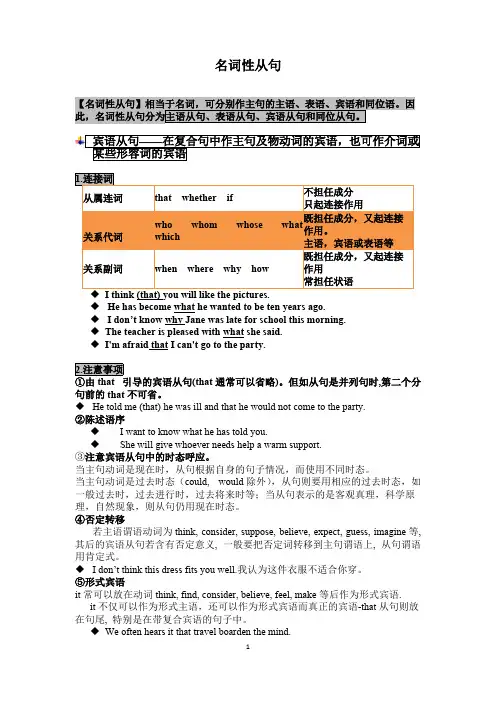
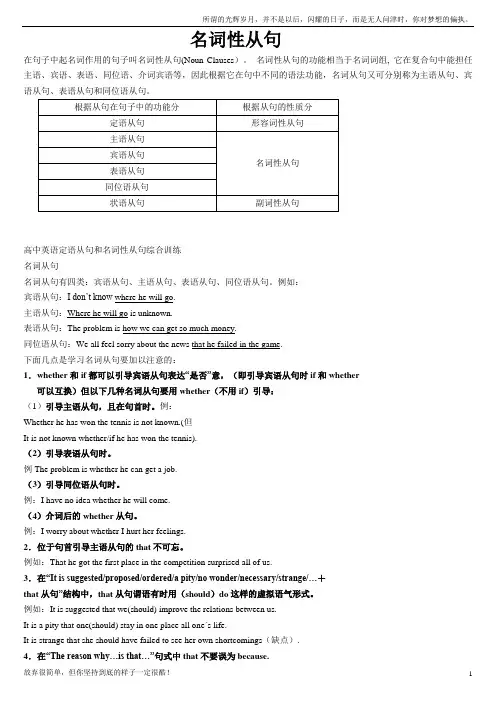
名词性从句在句子中起名词作用的句子叫名词性从句(Noun Clauses)。
名词性从句的功能相当于名词词组, 它在复合句中能担任主语、宾语、表语、同位语、介词宾语等,因此根据它在句中不同的语法功能,名词从句又可分别称为主语从句、宾语从句、表语从句和同位语从句。
高中英语定语从句和名词性从句综合训练名词从句名词从句有四类:宾语从句、主语从句、表语从句、同位语从句。
例如:宾语从句:I don’t know where he will go.主语从句:Where he will go is unknown.表语从句:The problem is how we can get so much money.同位语从句:We all feel sorry about the news that he failed in the game.下面几点是学习名词从句要加以注意的:1.w hether和if都可以引导宾语从句表达“是否”意,(即引导宾语从句时if和whether可以互换)但以下几种名词从句要用whether(不用if)引导:(1)引导主语从句,且在句首时。
例:Whether he has won the tennis is not known.(但It is not known whether/if he has won the tennis).(2)引导表语从句时。
例The problem is whether he can get a job.(3)引导同位语从句时。
例:I have no idea whether he will come.(4)介词后的whether从句。
例:I worry about whether I hurt her feelings.2.位于句首引导主语从句的that不可忘。
例如:That he got the first place in the competition surprised all of us.3.在“It is suggested/proposed/ordered/a pity/no wonder/necessary/strange/…+that从句”结构中,that从句谓语有时用(should)do这样的虚拟语气形式。
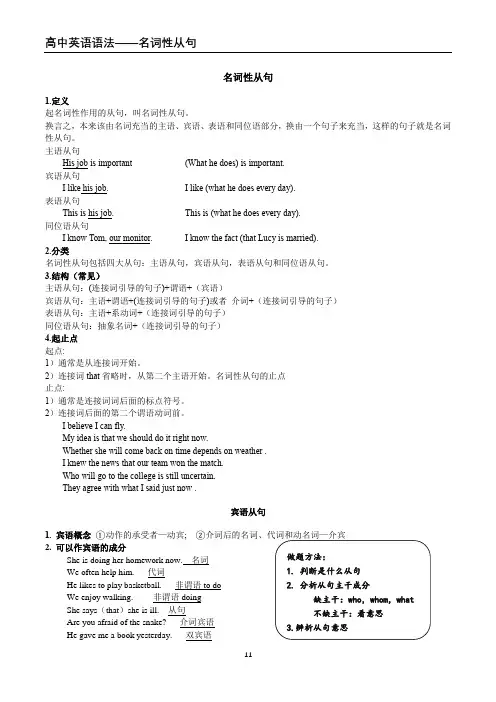
名词性从句1.定义起名词性作用的从句,叫名词性从句。
换言之,本来该由名词充当的主语、宾语、表语和同位语部分,换由一个句子来充当,这样的句子就是名词性从句。
主语从句His job is important(What he does) is important.宾语从句I like his job.I like (what he does every day).表语从句This is his job.This is (what he does every day).同位语从句I know Tom, our monitor.I know the fact (that Lucy is married).2.分类名词性从句包括四大从句:主语从句,宾语从句,表语从句和同位语从句。
3.结构(常见)主语从句:(连接词引导的句子)+谓语+(宾语)宾语从句:主语+谓语+(连接词引导的句子)或者介词+(连接词引导的句子)表语从句:主语+系动词+(连接词引导的句子)同位语从句:抽象名词+(连接词引导的句子)4.起止点起点:1)通常是从连接词开始。
2)连接词that省略时,从第二个主语开始。
名词性从句的止点止点:1)通常是连接词词后面的标点符号。
2)连接词后面的第二个谓语动词前。
I believe I can fly.My idea is that we should do it right now.Whether she will come back on time depends on weather .I knew the news that our team won the match.Who will go to the college is still uncertain.They agree with what I said just now .宾语从句3. 宾语从句概念从句在主句中作宾语4.宾语从句的分类1)动词后宾语从句结构:①及物动词+宾语从句②及物动词+宾语1+宾语从句I know that well begun is half done .He promised us that he would offer us more assists later on.He has informed me when he is to solve the problem.注:谓语动词通常为接双宾语的及物动词,如tell, give, inform等,结构通常为v.+ sb. + sth.考查形式为:“v. +( v.+其它)”All of us have already known she will choose is the opportunity to go abroad2)介词后宾语从句结构:介词+宾语从句We are not interested in whether you will agree with us about who will win the game.When you are reading, make a note of what you think is of great importance.注: 在介词后的宾语从句中,连接词that不可以省略。
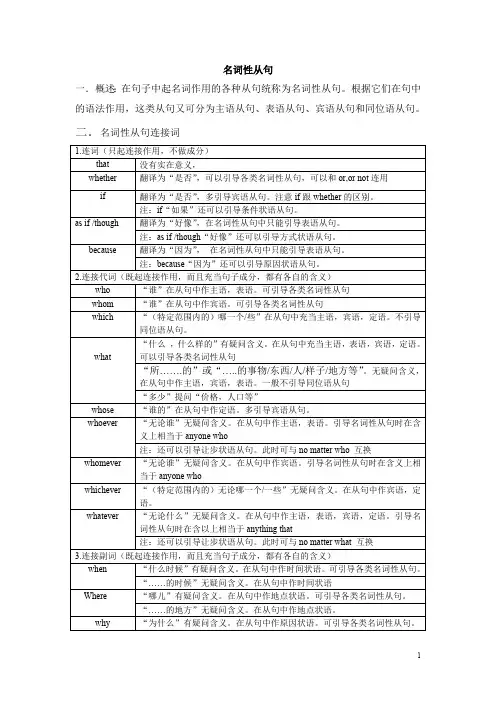
名词性从句一.概述:在句子中起名词作用的各种从句统称为名词性从句。
根据它们在句中的语法作用,这类从句又可分为主语从句、表语从句、宾语从句和同位语从句。
二.名词性从句连接词1.连词(只起连接作用,不做成分)that没有实在意义,whether翻译为“是否”,可以引导各类名词性从句,可以和or,or not连用if翻译为“是否”,多引导宾语从句。
注意if跟whether的区别。
注:if“如果”还可以引导条件状语从句。
as if /though翻译为“好像”,在名词性从句中只能引导表语从句。
注:as if /though“好像”还可以引导方式状语从句。
because翻译为“因为”,在名词性从句中只能引导表语从句。
注:because“因为”还可以引导原因状语从句。
2.连接代词(既起连接作用,而且充当句子成分,都有各自的含义)who“谁”在从句中作主语,表语。
可引导各类名词性从句whom “谁”在从句中作宾语。
可引导各类名词性从句which“(特定范围内的)哪一个/些”在从句中充当主语,宾语,定语。
不引导同位语从句。
“什么,什么样的”有疑问含义。
在从句中充当主语,表语,宾语,定语。
what可以引导各类名词性从句“所…….的”或“…..的事物/东西/人/样子/地方等”。
无疑问含义,在从句中作主语,宾语,表语。
一般不引导同位语从句“多少”提问“价格,人口等”whose“谁的”在从句中作定语。
多引导宾语从句。
whoever“无论谁”无疑问含义。
在从句中作主语,表语。
引导名词性从句时在含义上相当于anyone who注:还可以引导让步状语从句。
此时可与no matter who 互换whomever“无论谁”无疑问含义。
在从句中作宾语。
引导名词性从句时在含义上相当于anyone whowhichever“(特定范围内的)无论哪一个/一些”无疑问含义。
在从句中作宾语,定语。
whatever“无论什么”无疑问含义。
在从句中作主语,表语,宾语,定语。
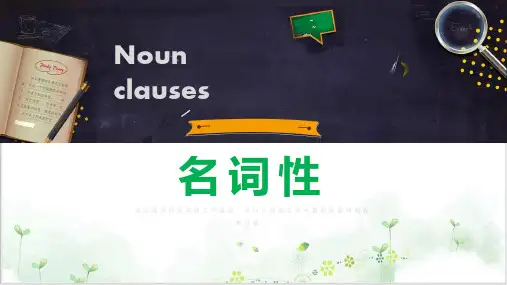
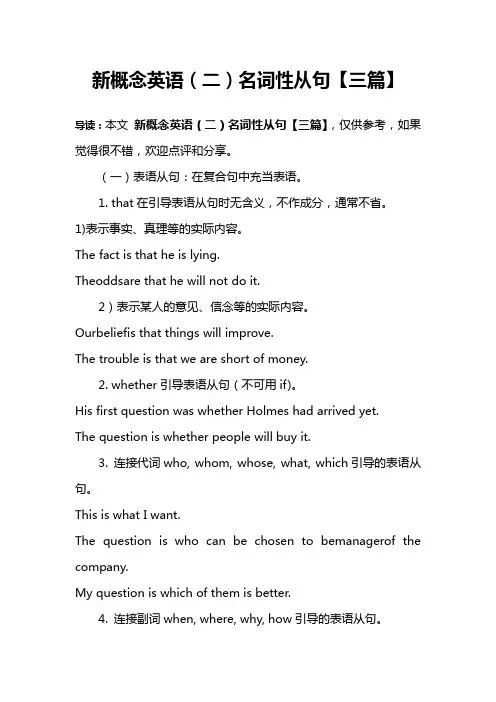
新概念英语(二)名词性从句【三篇】导读:本文新概念英语(二)名词性从句【三篇】,仅供参考,如果觉得很不错,欢迎点评和分享。
(一)表语从句:在复合句中充当表语。
1. that在引导表语从句时无含义,不作成分,通常不省。
1)表示事实、真理等的实际内容。
The fact is that he is lying.Theoddsare that he will not do it.2)表示某人的意见、信念等的实际内容。
Ourbeliefis that things will improve.The trouble is that we are short of money.2. whether引导表语从句(不可用if)。
His first question was whether Holmes had arrived yet.The question is whether people will buy it.3. 连接代词who, whom, whose, what, which引导的表语从句。
This is what I want.The question is who can be chosen to bemanagerof the company.My question is which of them is better.4. 连接副词when, where, why, how引导的表语从句。
The problem seemed how we could make him understand it. The question is where we should go.5. as if, as though引导的表语从句(常用虚拟语气)。
He looks as if he were angry.It looks as if it's going to rain.(二)宾语从句:在复合句中充当宾语。
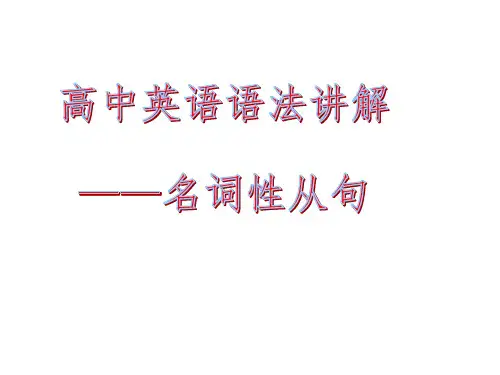
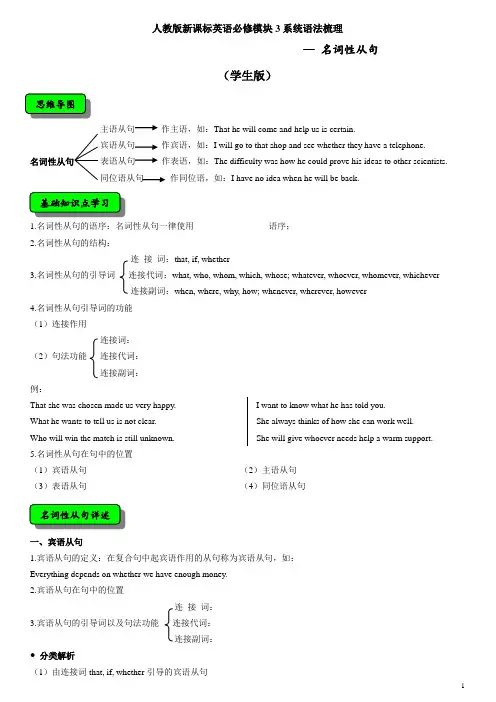
人教版新课标英语必修模块3系统语法梳理— 名词性从句(学生版)主语从句作主语,如:That he will come and help us is certain.宾语从句 作宾语,如:I will go to that shop and see whether they have a telephone. 名词性从句 表语从句 作表语,如:The difficulty was how he could prove his ideas to other scientists. 同位语从句 作同位语,如:I have no idea when he will be back. 1.名词性从句的语序:名词性从句一律使用_________________语序; 2.名词性从句的结构:连 接 词:that, if, whether3.名词性从句的引导词 连接代词:what, who, whom, which, whose; whatever, whoever, whomever, whichever 连接副词:when, where, why, how; whenever, wherever, however4.名词性从句引导词的功能 (1)连接作用连接词: (2)句法功能 连接代词: 连接副词: 例:That she was chosen made us very happy. What he wants to tell us is not clear. Who will win the match is still unknown. I want to know what he has told you. She always thinks of how she can work well. She will give whoever needs help a warm support.5.名词性从句在句中的位置 (1)宾语从句 (2)主语从句 (3)表语从句 (4)同位语从句一、宾语从句1.宾语从句的定义:在复合句中起宾语作用的从句称为宾语从句,如: Everything depends on whether we have enough money.2.宾语从句在句中的位置连 接 词: 3.宾语从句的引导词以及句法功能 连接代词: 连接副词:● 分类解析(1)由连接词that, if, whether 引导的宾语从句他认为战争是一件可怕的事情。
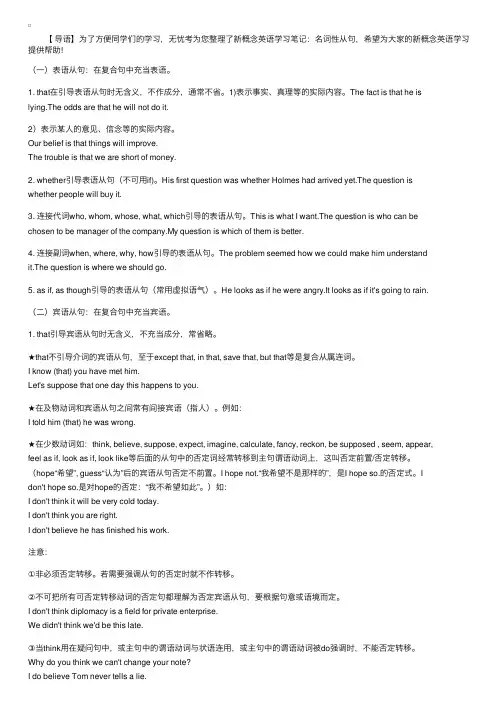
【导语】为了⽅便同学们的学习,⽆忧考为您整理了新概念英语学习笔记:名词性从句,希望为⼤家的新概念英语学习提供帮助!(⼀)表语从句:在复合句中充当表语。
1. that在引导表语从句时⽆含义,不作成分,通常不省。
1)表⽰事实、真理等的实际内容。
The fact is that he islying.The odds are that he will not do it.2)表⽰某⼈的意见、信念等的实际内容。
Our belief is that things will improve.The trouble is that we are short of money.2. whether引导表语从句(不可⽤if)。
His first question was whether Holmes had arrived yet.The question iswhether people will buy it.3. 连接代词who, whom, whose, what, which引导的表语从句。
This is what I want.The question is who can bechosen to be manager of the company.My question is which of them is better.4. 连接副词when, where, why, how引导的表语从句。
The problem seemed how we could make him understandit.The question is where we should go.5. as if, as though引导的表语从句(常⽤虚拟语⽓)。
He looks as if he were angry.It looks as if it's going to rain.(⼆)宾语从句:在复合句中充当宾语。
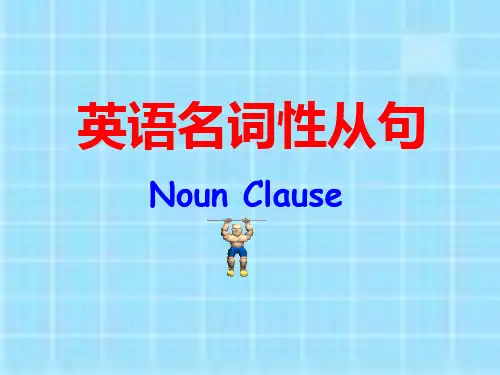
名词性从句(Noun Clause)名词性从句定义:起名词性作用的从句,叫名词性从句。
换言之,在英语的句子结构中,本来该由名词充当的主语、宾语、表语和同位语部分,换由一个句子来充当,这样的句子就是名词性从句。
名词性从句的种类:1. 主语从句:在复合句中充当主语的从句。
e.g. That price will go up is certain.2. 宾语从句:在复合句中作宾语的从句(位于及物动词,介词和形容词后)。
e.g. We hope t hat you will enjoy your stay here.3. 表语从句:在复合句中作表语的从句,放在系动词之后。
e.g. The reason was that he didn’t work hard.4. 同位语从句:在复合句中作名词的同位语的从句。
e.g. He accepted the fact that she would never come back.一、从属连词:that/whether/if1、That we will realize our dreams in the future is certain . ()2、The fact is that he earned his passage by working as an unpaid hand. ()3、I know that well begun is half done . ()4、He heard the news that Liuxiang set a new world record . ()5、Whether she will come back on time depends on weather . ()6、The problem is whether you could give us some valuable advice . ()7、I asked him whether he could do me a favor . ()8、Could you tell me the question whether English is useful for us now. ()9. Let us know whether / if you can finish the article before Friday. ()二、连接代词:who/whom/what/which/whose1、Who will go to the college is still uncertain . ()2、The trouble is who could lend me some money . ()3、He wanted to know who picked up his mobile phone . ()4、Whom you will learn from is worth thinking over . ()5、The thing I am anxious about is whom he will turn to for help . ()6、His mother asked him whom he could believe in . ()7、What I desire to get is a good reputation . ()8、What he will tell me is what I have been expecting to know . ()9、They agree with what I said just now. ()10、Which class is suitable for us isn’t most important . ()11、What he wants to ask you now is which team won the game . ()12、Could you tell me which one is right. ()13、Whose bag was the most beautiful is still unknown now . ()14、The question is whose friends could lend me a hand . ()15、I want to know whose suggestion is more practical . ()三、连接副词:when/where/why/how1、When the meeting will begin isn’t decided now .()2、The trouble is when he could recover from the disease . ()3、He asked us when we would graduate from the school . ()1、Where I could buy the book is uncertain now . ()2、His question was where we would hold the opening ceremony . ()3、I couldn’t tell you where they have been living .()1、Why he killed himself is still a secret now . ()2、What surprised me was why they failed again . ()3、I just want to ask you why I was fired . ()1、How the thief stole the bike is still a mystery . ()2、What the professor asked us was how we could make our parents happy . ()3、I will go to ask my teacher how I could work out the problem . ()实践演练用that / what填空:1.______ he wants is a book.2. ______ he wants to go there is obvious.3. The result is ______ we won the game.4. This is _____ we want to know.5. Is _____ he told us true?6. We should pay attention to ______ the teacher is saying.7. I have no doubt _____ he will come.8. I have no idea _____ he did that afternoon.实践演练1. Mary wrote an article on _________ the team had failed to win the game.2. There is a problem _______ they should continue the work.3. See the flags on top of the building? That was _____ we did this morning.4. Please remind me ______ he was going. I may be in time to see him off.5. A warm thought suddenly came to me ________ I might use the pocket money to buy some flowers for my mother’s birthday.6. Some researchers believe that there is no doubt ______ a cure for AIDS will be found.7. We cannot figure out _______ quite a number of insects, birds, and animals are dying out.8. Parents are taught to understand ______ important education is to their children’s futu re.9. You are saying that everyone should be equal, and this is _______I disagree.10. You are saying that everyone should be equal, and this is _______I disagree with.。
名词性从句养成良好的答题习惯,是决定成败的决定性因素之一。
做题前,要认真阅读题目要求、题干和选项,并对答案内容作出合理预测;答题时,切忌跟着感觉走,最好按照题目序号来做,不会的或存在疑问的,要做好标记,要善于发现,找到题目的题眼所在,规范答题,书写工整;答题完毕时,要认真检查,查漏补缺,纠正错误。
一、主语从句主语从句是在复合句中担任主语的句子。
其特点有:(1)引导词:从属连词that, whether;连接代词who, what, which;whoever, whatever, whichever;连接副词when, where, how和why。
(2)语序:陈述句语序(3)在主语从句中只能用whether,不能用ifThat he will win the match is certain.It is certain that he will win the match.1. 一般来说主语从句都是放在句首,但有时为了使句子保持平衡,避免"头重脚轻",常用it作形式主语,从而把主语从句放后面。
常以it作形式主语的句型有:①It is+形容词+that...It is certain that she will do well in her exam.毫无疑问她考试成绩会很好。
①It is+名词词组(no wonder,an honour,a good thing,a pity,no surprise,common knowledge,a surprise,a fact,etc. )+that...It’s a pity that we can’t go.很遗憾我们不能去。
①It is+过去分词(said,reported,thought,expected,decided,announced,arranged,etc. )+that...It has been suggested that much should be done to prevent the river from being polluted.有人建议应做更多的工作阻止河流遭受污染。
高考英语新名词性从句知识点解析含答案一、选择题1.He sold his house for twice ________ he paid for it so he did well out of the deal.A.how B.what C.that D.which 2.Andrew is such a rebellious person that he often offends against _______ others consider accepted rules.A.that B.what C.which D.whether3.It is _______ he said _______ is very important to me.A.what; that B.that; that C.all that; what D.which; that4._________ has recently been done to provide more buses, a shortage of public vehicles remains a serious problem.A.That B.What C.In spite of what D.Though what 5.When the news came ___ the war broke out , he decided to serve in the army.A.since B.which C.that D.because 6.Much to the couple's comfort,their income is now double ________ it was five years ago. A.that B.if C.which D.what7.—I don’t know _______ you got to know my telephone number.—Through a friend of mine.A.how was it B.how was it that C.it was how that D.how it was that 8.The other day, my brother drove his car down the street at _____ was a dangerous speed. A.as B.what C.which D.that9.__________ is no possibility __________ Bob can win the first prize in the match . A.There ; whether B.There ; that C.It ; whether D.It ; that10.All of us were so excited at the news ____we’ll go abroad for holidays ___we jumped with joy.A.that; that B.what; and then C.what; that D.which; so11.If you are addicted to your mobile phone, that’s ______ you should lay it down and be involved in meaningful activities.A.when B.why C.where D.how12.______ they have won the game made us excited.A./B.That C.What D.Which13.— Would you please tell us the prospect of fighting against COVID-19?—We are sure to win the battle, but ______ it’ll be over soon I’m not sure at the moment. A.whether B.that C.if D.when14.The weather is fi ne. I’m sure ________ we can go camping this afternoon.A.why B.what C.that D.if15.Craig is always sticking his nose in ______ it’s not wanted. He is always trying to find out my personal information.A.what B.which C.where D.that16.—The hillside village remains primitive and unspoiled.—That explains ______ people desire to explore such a remote place.A.how B.where C.when D.why17.—Is it true that Mike refused an offer from Yale University yesterday?—Yeah, but I have no idea _____________ he did it; th at’s one of his favorite universities. A.when B.whyC.that D.how18.My grandmother helped me believe that I could accomplish ____________ I put my mind to. A.whenever B.whatever C.wherever D.whichever19.It was__ he said__ disappointed me.A.that;what B.what;that C.what;what D.that;that20.As John Lennon once said, life is ________ happens to you while you are busy making other plans.A.Which B.thatC.what D.where21.____________he’ll be able to come is not yet known.A.That B.If C.Whether D.What22.It is estimated that 12.79 million new urban jobs have been created this year, which almost doubles _____ it was last year.A.how B.which C.where D.what23.—It’s reported that the new underground line has been completed.—Yes, but it hasn’t been made clear it’s to be opened to traffic.A.that B.who C.what D.when24.With wonderful views of mountains and beaches,Lovers Point Park is________many people get married.A.where B.what C.which D.how 25.Students show great interest in ________ Professor William presents to them in his class. A.whichever B.wherever C.whatever D.however【参考答案】***试卷处理标记,请不要删除一、选择题1.B解析:B【解析】【分析】【详解】考查名词性从句。
最新名词性从句知识点(大全)经典一、名词性从句1.________ is the centre of our planetary system was a difficult concept to grasp in the Middle Ages.A. It's the sun and not the earthB. The sun and not the earthC. Being the sun and not the earthD. That the sun and not the earth【答案】 D【解析】【分析】句意:太阳而不是地球是我们行星系统的中心,这在中世纪是一个很难理解的概念。
分析句子可知,整个句子为主系表结构,was为系动词,它之前的都为主语,且主语由句子来充当,句子结构以及句意完整,所以连词代词为that。
故选D。
【点评】考查名词性从句,本题涉及that引导的主语从句。
2.___ surprised me most was ____the girl passed the driver test.A. That; thatB. What; howC. What; thatD. That; why【答案】 C【解析】【分析】句意:最让我吃惊的是那个女孩通过了驾驶考试。
___ surprised me most是一个主语从句,从句中缺少主语,故填what;____the girl passed the driver test 是一个表语从句,句中不缺少成分,故填that。
因此选C。
【点评】考查名词性从句,本题涉及what引导的主语从句和that引导的表语从句。
3. is clear to the members of the committee is that the President will not give in to their demands.A. WhoB. ItC. AsD. What【答案】 D【解析】【分析】句意:委员会成员清楚的是,总统不会向他们的要求让步。
名词性从句1.名词:表示人或事物的名称的词叫名词。
2.名词在句子当中一般可以作什么成分? The boy is li Ming.主语表语Mr. Liang , a 24-year-old boy, teaches us English . 主语同位语宾语名词在句中主要作主语、宾语、表语和同位语。
什么是名词性从句?在英语的句子结构中,由一个句子来充当主语、宾语、表语和同位语, 这个句子就叫名词性从句。
名词性从句:主语从句( The Subject Clause)宾语从句( The Object Clause表语从句( The Predicative Clause)同位语从句( The Appositive Clause) 请判断出下列的句子属于哪种从句:1. What I want to do is taking a bath.2.The news that they won the gamespread the whole school.3. I don’t think he is an honest boy.4. The fact is that he stole the car.5. Do you know the fact that he stole thecar?6. Do you know the man who is standingover there?7. It is said that they won the game.试区分以下句子:Is this museum what you visited?Is this the museum that you visited?Is this museum the one that you visited?同位语从句在句中用作同位语的从句叫做同位语从句。
同位语从句一般放在如idea, news, fact, promise, suggestion, belief, truth, possibility等含有丰富内涵的名词后面,用来说明前面那个词的具体内容。
一般说来,同位语从句都用that来作连接词,而且不能省略。
也可用how, when, where等。
where he has gone.whether he’ll come back. eg. I have no idea when he’ll come back.who will come here.how he’ll come here.which book is mine.试区分以下句子:Do you know the fact that he stole the car? Do you know the fact that they were talking about?同位语从句与定语从句的不同之处:1、从句的作用不同:同位语从句用来进一步说明前面名词的内容;定语从句用来修饰、限定前面的名词。
e.g. The news that our team has won the final match is encouraging. (从句说明“消息”的内容:我们队取得了决赛胜利。
)The news that you told us is really encouraging.(从句对“消息”加以限定:是你告诉我们的,而非来自其他渠道。
但消息是何内容却不得而知。
)2、引导从句的关联词that的功能不同:that 引导同位语从句时是一个纯连词,不充当任何成分;而引导定语从句的that是关系代词,既指代先行词又须在从句中充当成分。
e.g.1) Dad made a promise that he would buy me CD player if I passed the English test. (that 不充当任何成分)2) Dad made a promise that excited all his children.(that指代promise,又在从句中充当主语。
)同位语从句的简易判断方法:我们可以在名词和从句之间加be,使之构成一个新句子,如果合乎逻辑,句子通顺,则是同位语从句,定语从句是不能用系表结构把先行词与从句连接起来的。
eg: The belief that the earth is flat is still held in some countries.The belief is that the earth is flat.区分下列句子:1.The news that the plane would take off on time made everybody happy.2.The news that is spreading around the airport is that a heavy storm is coming.3.The suggestion that students should learn something practical is worth considering.4.The suggestion that they are considering is that students should learn something practical.从引导词及其在句子中的成分上区别有些引导词如how, whether, what可以引导同位语从句, 但不能引导定语从句。
如: That question whether we need it has not been considered. (同位语从句)我们是否需要它这个问题还没有考虑。
I. Tell the function of the clauses in the following sentences说出下列从句的功能:A:Appositive(同位语; B:Attributive(定语)1.H is proposal that we go there on foot isacceptable.2.M any teachers hold the view thatteenagers should not spend too much time online.3.The first request that he made was to ask for freedom.4. Do you have any idea where we will be sent?5. Is this the company where your father works?6. This is the reason that he gave for his absence.7. He made an excuse that his car broke down on the way.单项填空:1.The question is ____the film is worth seeing.A. ifB. whatC. whetherD. how2.They received orders _____ the work be done at once.A .which B. when C. / D .that3.The reason ____ I have to go is ____ my mother is ill in bed.A .why; why B. why; becauseC. why ; thatD. that; because4. ___ I can’t understand is ___ she wants to change her mind.A. What; whyB. Which; howC. That; whyD. What; because5. ____ his dream of going to college will come true is uncertain.A.ThatB.WhetherC. IfD. Even if6. It is known to us ___ where there is pollution, there is harm.A. whichB. whereC. whatD. that7. I have the information ____.A. of what he’ll come soonB. that he’ll come soonC. of that he’ll come soonD. his coming soon8. --- I saw your neighbor break your window with a basketball.--- ____ it made me nearly mad.A. That he brokeB. What he brokeC. He brokeD. His break9.It remains a question ____ we can get so much money in such a short time.A.howB. thatC. whenD. what10.--- Can I help you?--- Yes, do you know ____?A. when comes the busB. when will come the busC. when does the bus comeD. when the bus comes11. He made a promise ___ anyone set him free he would make him very rich.A. thatB. ifC. whatD. that if12. They lost their way in the forest and____ made matters worse was ___ night began to fall.A. what; thatB. it; thatC. what; whenD. which; what13. The fact ____ she works hard is well known to us all.A. thatB. whatC. whyD. which14. The fact ____ he was successful proves his ability.A. thatB. whatC. whichD. why15.The news ____ he was kidnappedsurprised us greatly.A. whatB. thatC. whyD. when16. His suggestion ____ the meeting be delayed was turned down.A. whichB. thatC./D. it17. I have no idea ____ he will start.A. whenB. thatC. whatD./18. I've come from the government with a message ____ the meeting won't be held tomorrow.A. ifB. thatC. whetherD. which19. The thought ____ he might fail in theexam worried him.A.whenB.whichC.whatD. that20. The order ____ the prisoner be setfree arrived too late.A.whichB.whetherC.thatD. what 在空格处填上适当的词,使下列句子完整。